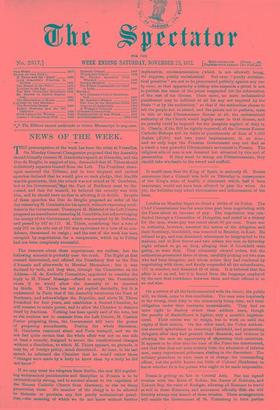• The rumours about these negotiations are endless, but the
following account is probably near the truth. The Right at first seemed determined, and offered the Presidency first to the Duc d'Aumale and afterwards to Marshal Macmahon ; but it was declined by both, and they then, through the Committee on the Address—M. de Kerdrel's Committee, appointed to consider the reply to M. Thiers' Message—offered to accept the President's views if he would allow the Assembly to be renewed by thirds. M. Thiers has not yet replied decidedly, but it is understood in Paris that if the Assembly terminates the Pact of Bordeaux, aud acknowledges the Republic, and elects M. Thiers President for four years, and establishes a Second Chamber, he will consent to retain power, and to allow the Chamber to dissolve itself by fractions. Nothing has been openly said of the veto, but as the motions are to emanate from the Left Centre, M. Casimir Perier proposing them, the Government will have the power of proposing amendments. During the whole discussion, M. Gambetta remained silent and Paris tranquil, and we do not feel quite certain that the whole affair was not on one side at least a comedy, designed to secure the constitutional changes without a dissolution, to which M. Thiers appears, on grounds, it may be, of foreign policy, much disinclined. At least, in his last speech he informed the Chamber that he would rather those "changes were made by a body he knew than by a body he did not know."


































